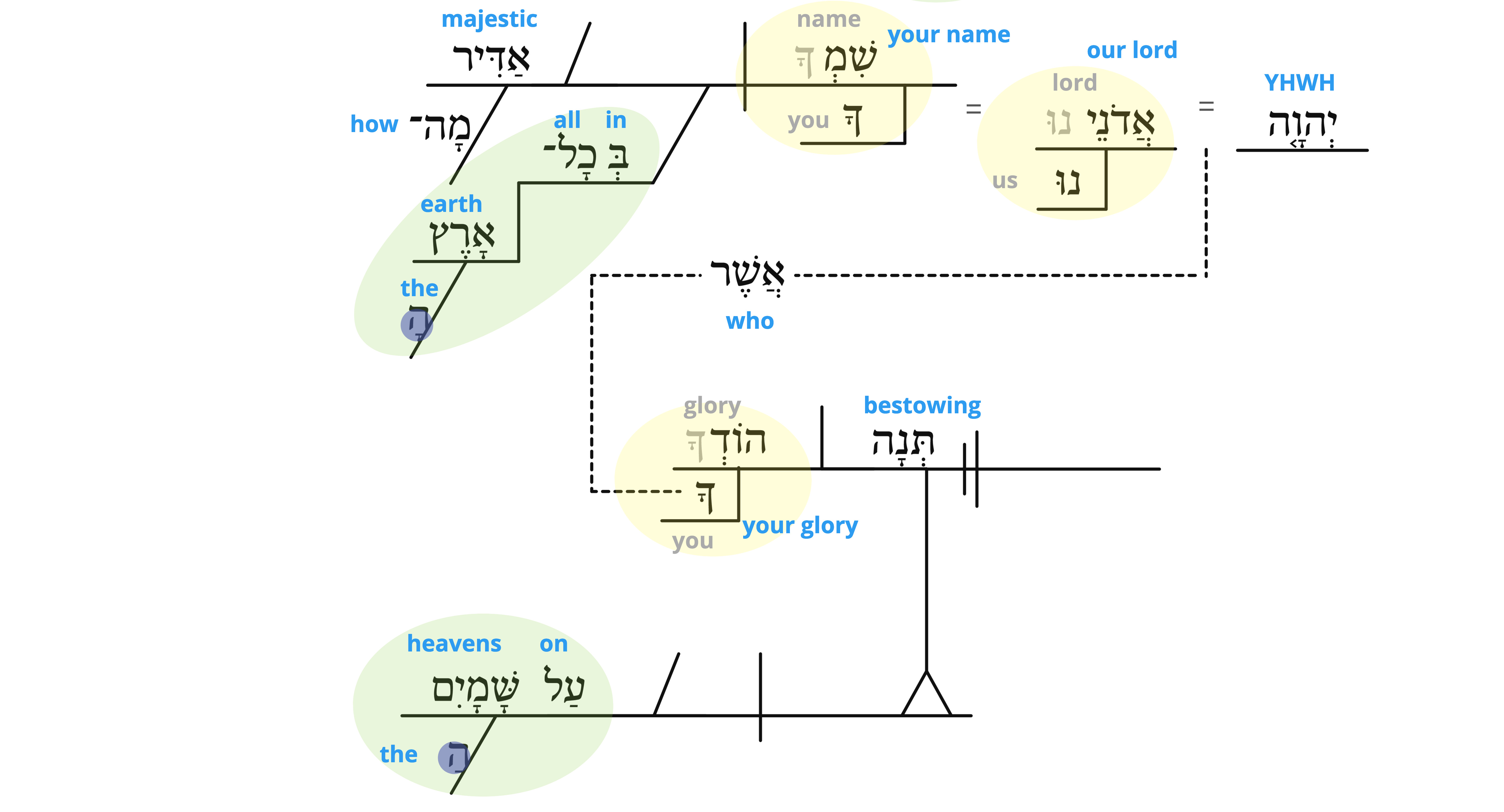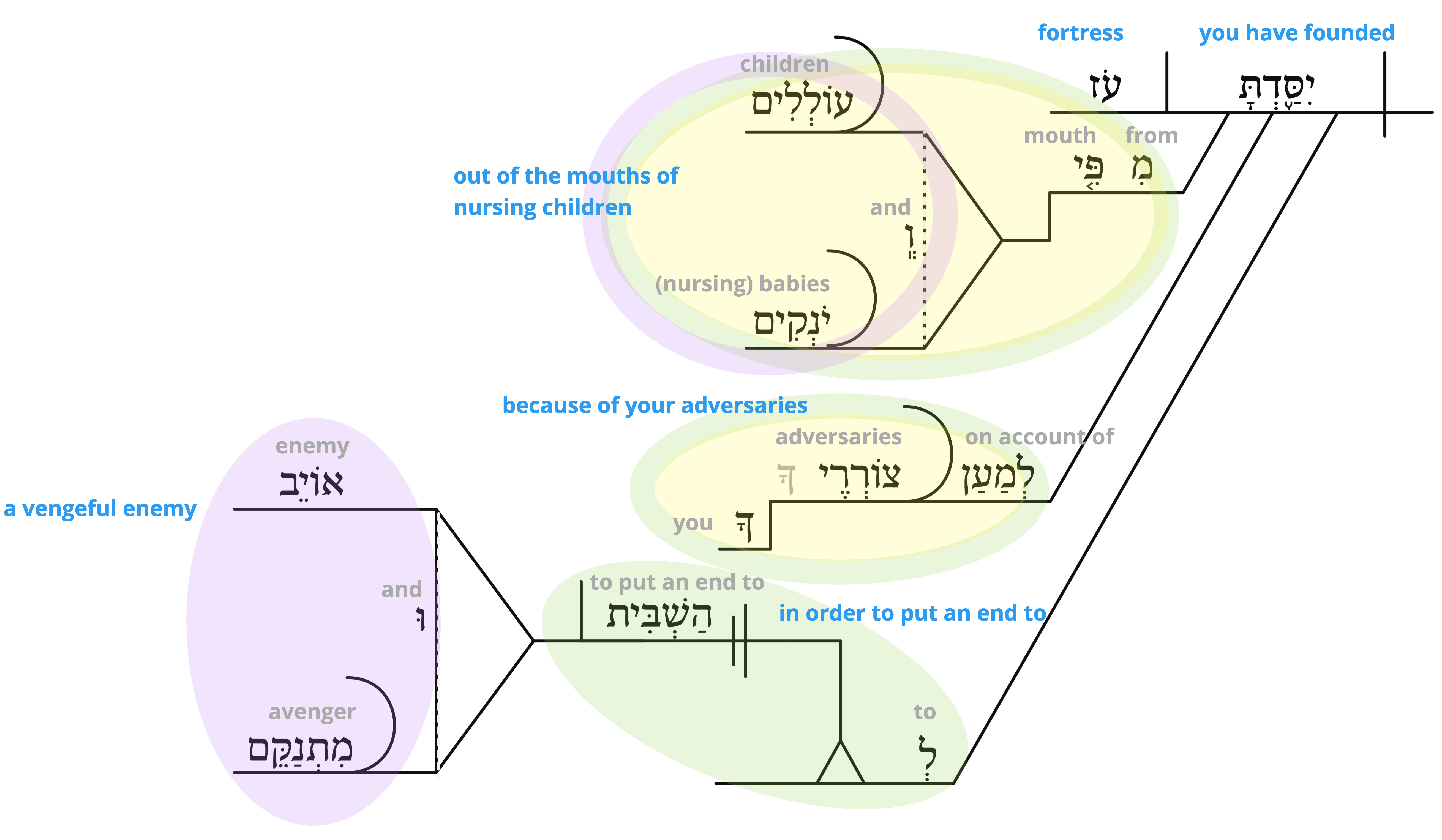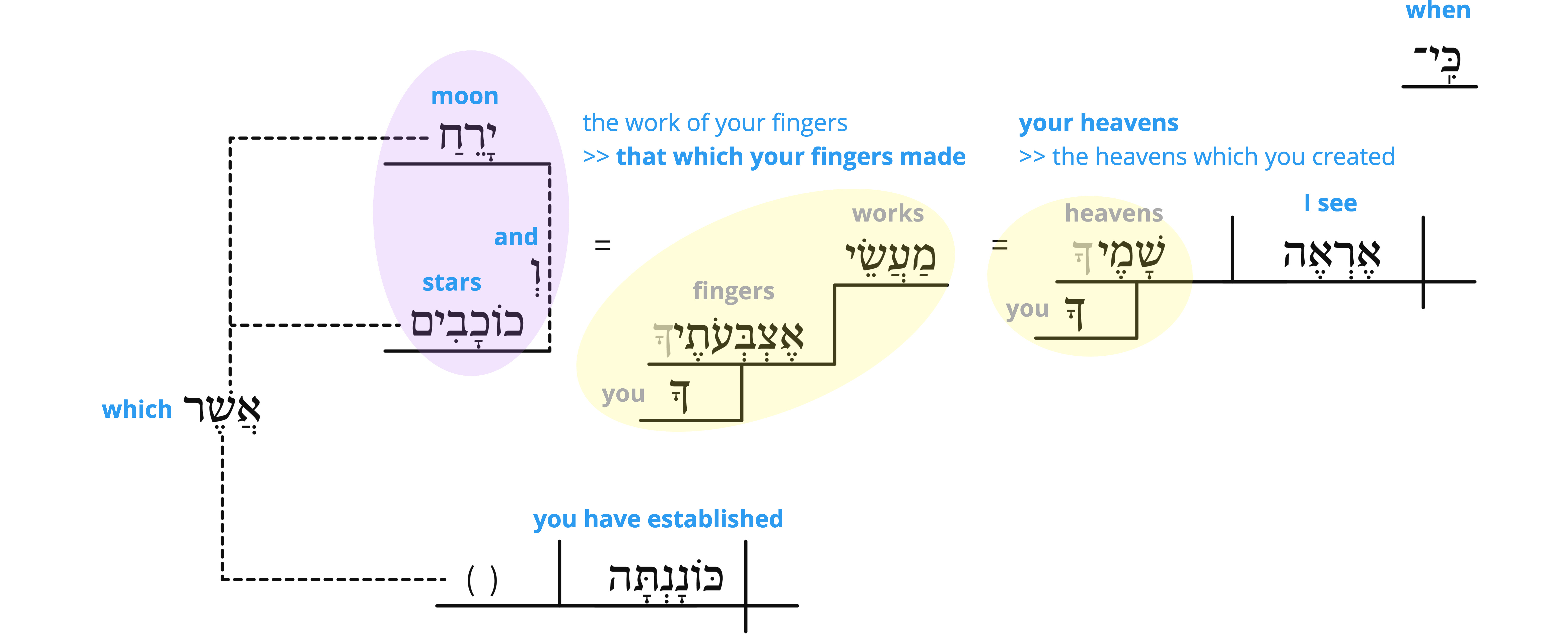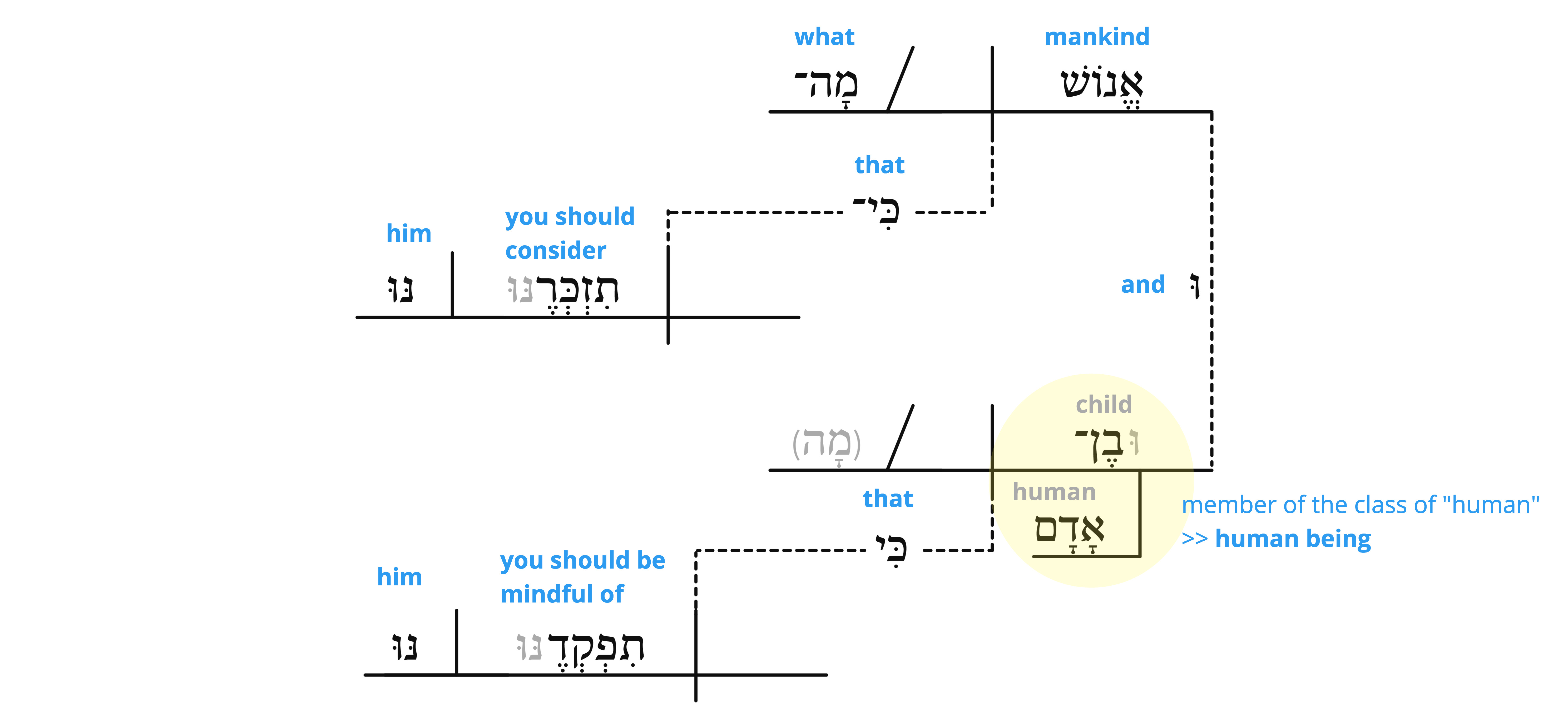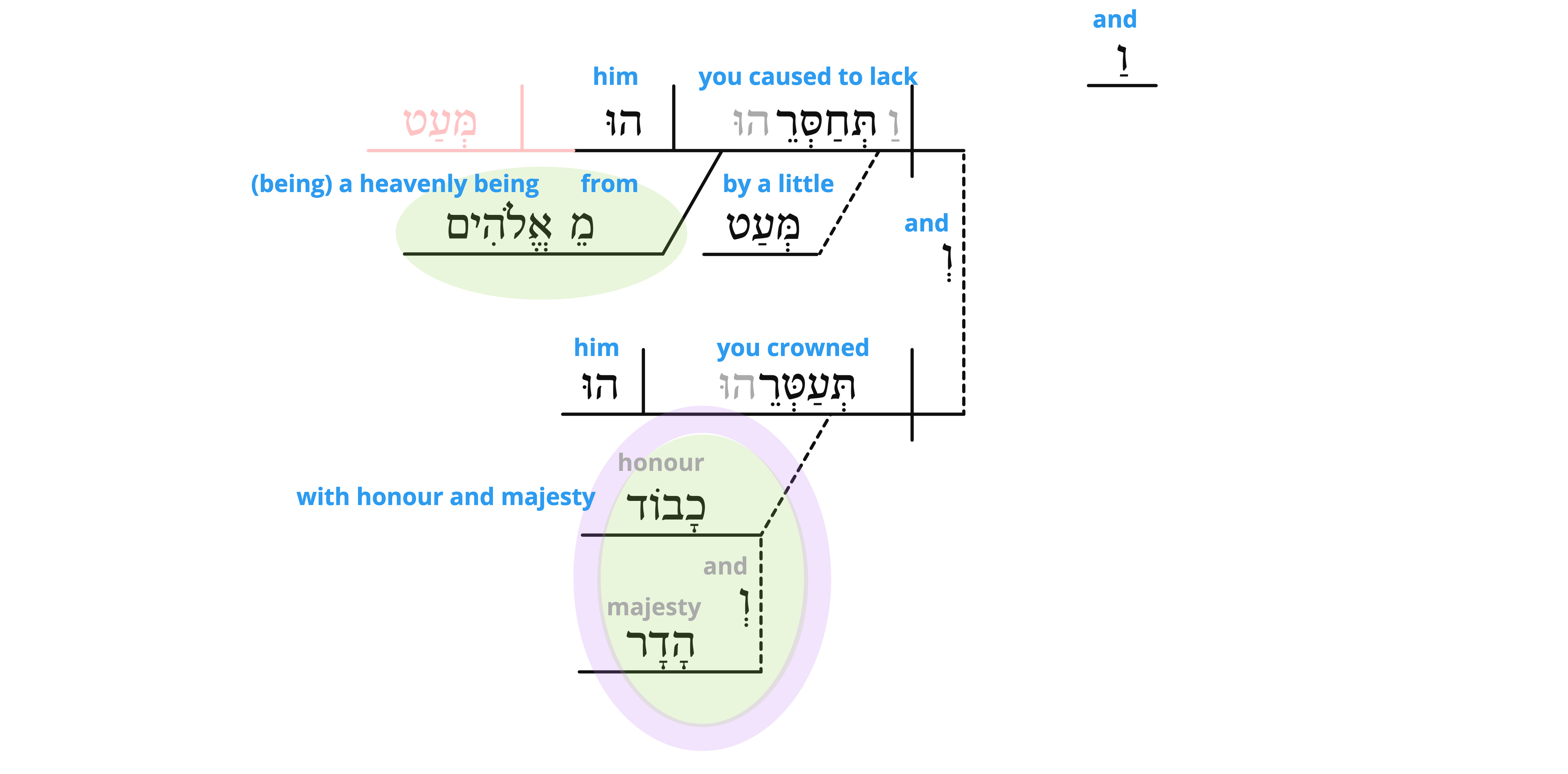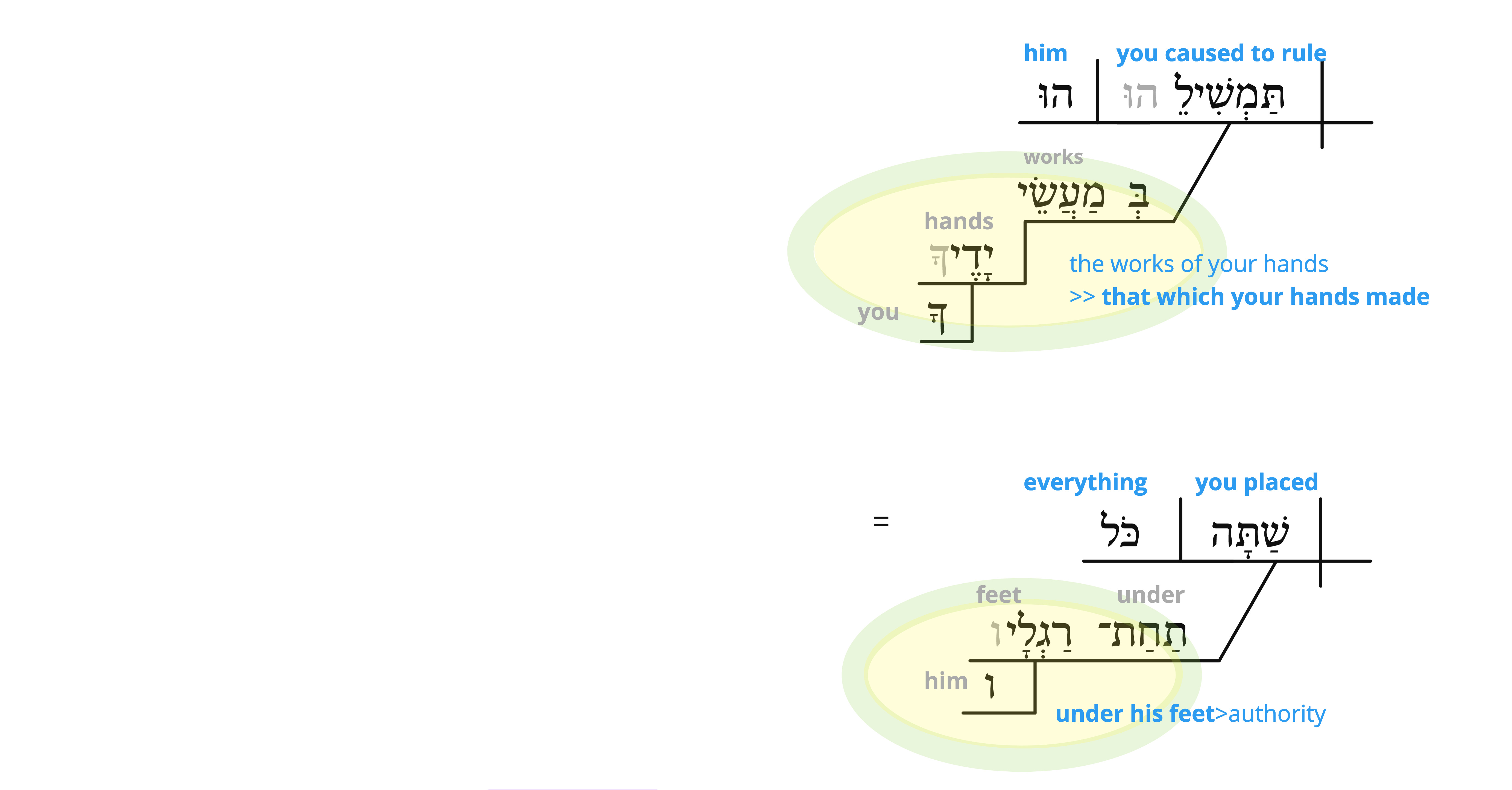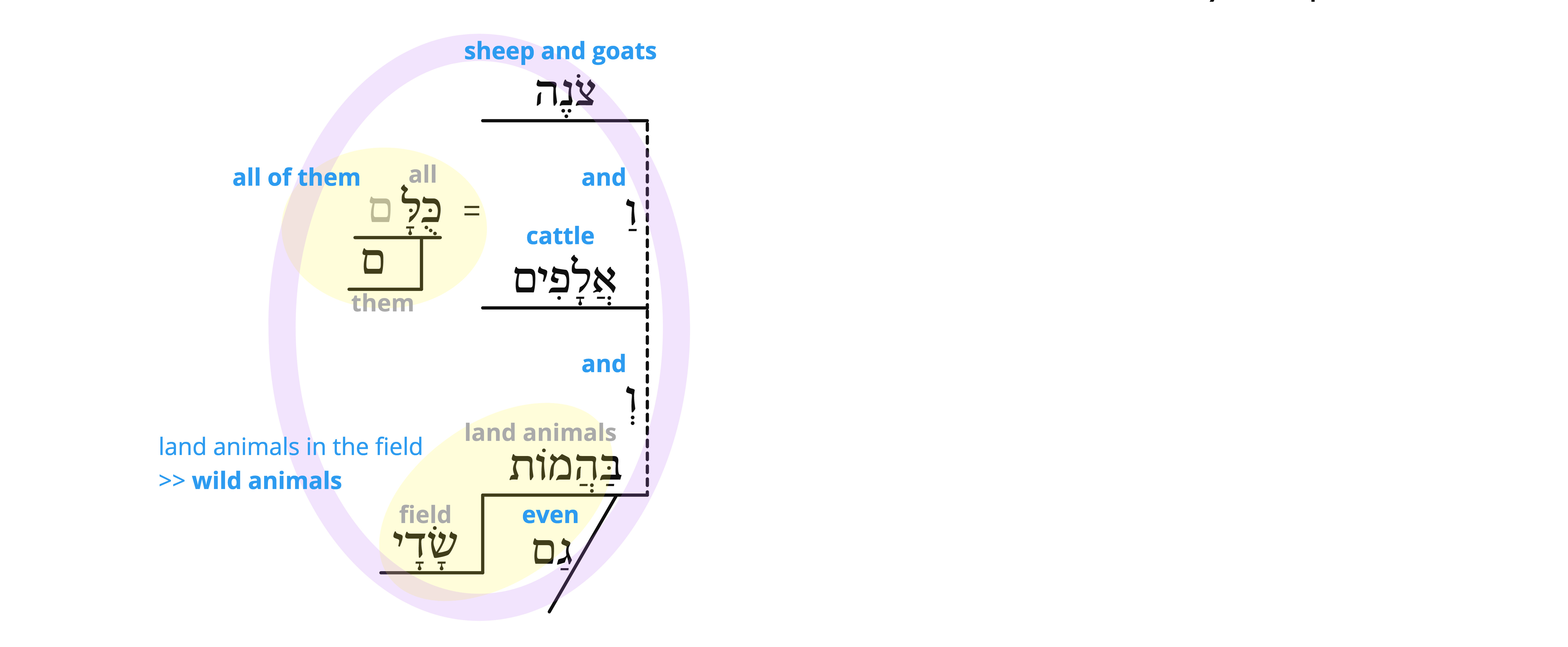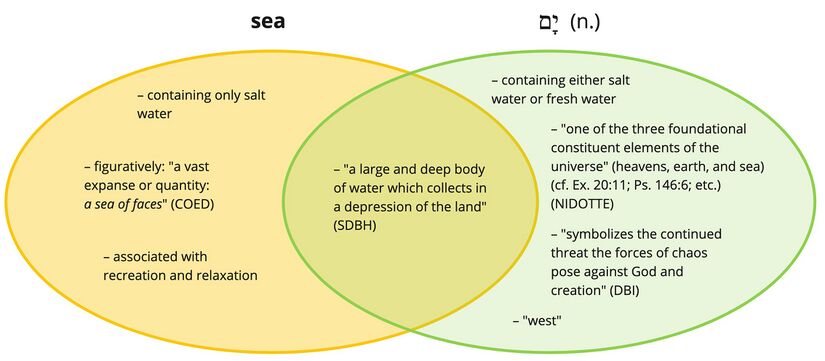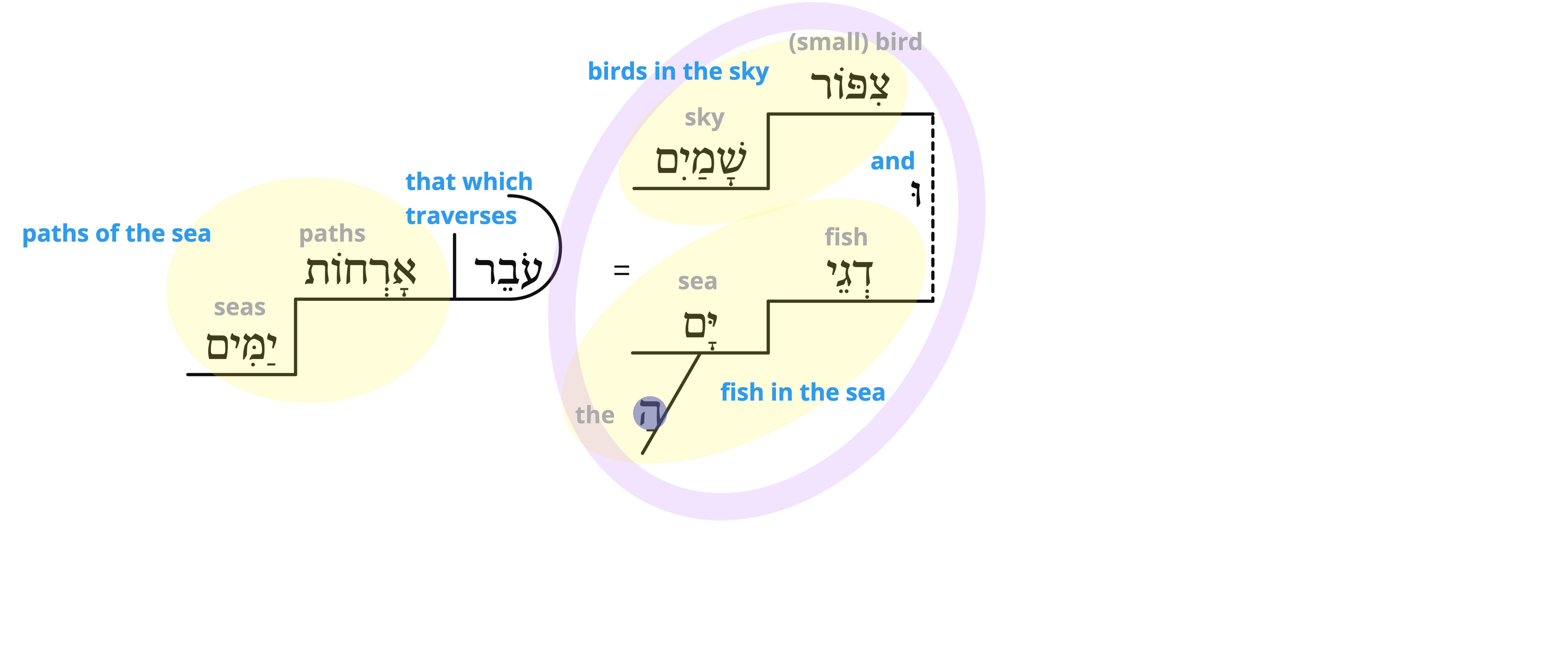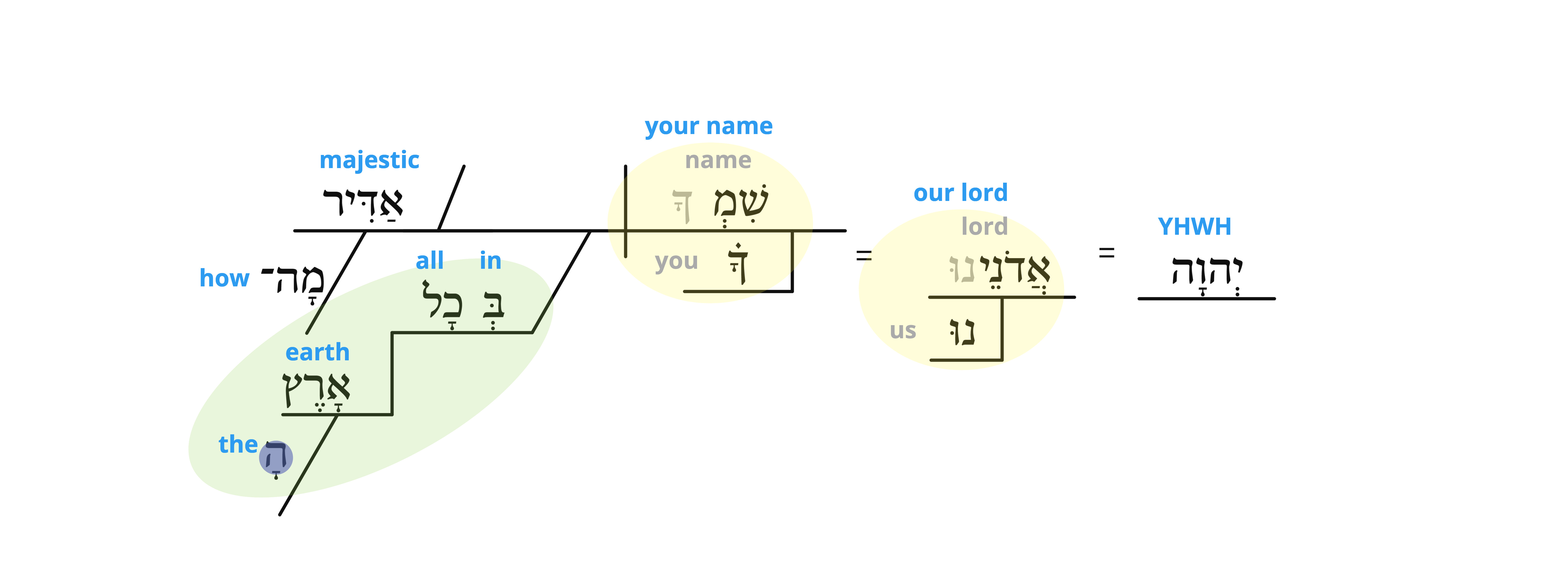Psalm 8 Verse-by-Verse: Difference between revisions
Ryan.Sikes (talk | contribs) (→Notes) |
Ryan.Sikes (talk | contribs) (→Notes) |
||
| Line 141: | Line 141: | ||
* The meaning of Ps. 8:6a is captured well by Wilson: "God has bestowed the highest possible honor on an earthly creature by creating them only a little less elevated than beings that occupy the heavenly sphere."<ref>Wilson 2002:207.</ref> In what respect is man lower than these beings? "The writer has only this one thing in his mind, that man is inferior to God, who is רוּח, and to the angels who are רוּחות (Isaiah 31:3; Hebrews 1:14) in this respect, that he is a material being, and on this very account a finite and mortal being."<ref>Delitzsch 1871</ref> "In his mortality and weakness the human being stands in antithesis to God (cf. Num. 23:19f.; Isa. 31:3), but in his role of ruler he approximates a heavenly being."<ref>Waltke 2010</ref> | * The meaning of Ps. 8:6a is captured well by Wilson: "God has bestowed the highest possible honor on an earthly creature by creating them only a little less elevated than beings that occupy the heavenly sphere."<ref>Wilson 2002:207.</ref> In what respect is man lower than these beings? "The writer has only this one thing in his mind, that man is inferior to God, who is רוּח, and to the angels who are רוּחות (Isaiah 31:3; Hebrews 1:14) in this respect, that he is a material being, and on this very account a finite and mortal being."<ref>Delitzsch 1871</ref> "In his mortality and weakness the human being stands in antithesis to God (cf. Num. 23:19f.; Isa. 31:3), but in his role of ruler he approximates a heavenly being."<ref>Waltke 2010</ref> | ||
[[File: Elohim in Ps. 8 6.jpg|750px|class=img-fluid]] | [[File: Elohim in Ps. 8 6.jpg|750px|class=img-fluid]] | ||
* | * The following ''yiqtol'' verbs–'''You crowned him... you caused him to rule''' (תְּעַטְּרֵֽהוּ / תַּ֭מְשִׁילֵהוּ) may be present/timeless<ref>ELB, cf. Goldingay 2006:159</ref>, future<ref>Aquila, Jerome, cf. Nicacci 2006:254; Craigie 2004:105-6</ref>, or past<ref>LXX, Theodotion, NIV, NLT, ESV, GNT, NET, NJB, LUT, HFA, NGÜ, EÜ, ZÜR</ref>. The h-suffix indicates that these are short ''yiqtols'', which are (past) perfective.<ref>Rainey 2008:80-81 A past tense interpretation of the yiqtols is supported by the following considerations: (1) In Deut. 32:10f, ''yiqtols'' with h-suffixes appear to be past perfective (cf. Jero, "Tense, Mood, and Aspect in the Biblical Hebrew Verbal System," 2017:74). (2) The oldest extant interpretation of these verbs (LXX) understood them to be past perfective (aorist). (3) The ''yiqtol'' verbs are sandwiched between verbs that are more clearly past perfective (''wayyiqtol'' in v. 6a and ''qatal'' in v. 7b). (4) The whole passage (vv. 6ff) is a reflection on the past act of creation.</ref> | ||
[[File: Psalm 29 - Kabod.jpg|500px|class=img-fluid]] | [[File: Psalm 29 - Kabod.jpg|500px|class=img-fluid]] | ||
Revision as of 13:44, 31 January 2023
For Expanded paraphrase, click "Expand" to the right
For Annotated grammatical diagram, click "Expand" to the right
v. 2
Watch the part of the Overview video on v. 2.
| v. | Hebrew | Close-but-clear |
|---|---|---|
| 2a | יְהוָ֤ה אֲדֹנֵ֗ינוּ מָֽה־אַדִּ֣יר שִׁ֭מְךָ בְּכָל־הָאָ֑רֶץ | YHWH, our lord, how majestic is your name in all the earth, |
| 2b | אֲשֶׁ֥ר תְּנָ֥ה ה֝וֹדְךָ֗ עַל־הַשָּׁמָֽיִם׃ | you whose glory is bestowed on the heavens! |
Expanded Paraphrase
YHWH, our lord, (you who are the great king over all creation and over your people, Israel,) how majestic is your name in all the earth, you whose (royal) glory is bestowed on the heavens (, on the sun, moon, and stars and other heavenly beings,) (on whom you have conferred some of your royal authority).
Grammatical Diagram with Phrase-level Glosses
Notes
- The psalm begins by addressing YHWH in the second person. In fact, the entire psalm is addressed to YHWH in the second person.[1]
- YHWH is identified as "our lord." A "lord" (אָדוֹן) is someone who exercises authority over a people or place.[2] Kings could be called "lords" (e.g., Gen. 40:1; 1 Kgs 22:17; 1 Chron 12:20), and here in Ps. 8:2 the title assumes YHWH's kingship; the word the "majestic" (אַדִּיר) in v. 2a is used to describe the majesty of kings (e.g., Pss. 136:18), as is the word "glory" (הוֹד) in v. 2b (e.g., Pss 21:6; 45:4).
- Following the opening address to YHWH is an exclamation; the particle How (מָה) here "functions as an introduction to an exclamation in which a speaker usually expresses a value judgment about something."[3] The value judgment which the speaker expresses is that YHWH's name is majestic.
- YHWH's "name" (שֵׁם) is not only the word by which he is "known, addressed, or referred to," but also "the information generally known about him;"[4] "name" (שֵׁם) can signify "the nature or attributes of the person named."[5] Thus, to say that YHWH's "name" is majestic in all the earth is to say that YHWH is characterized by and known by his majesty which is on display throughout all the earth.
- The sphere of YHWH's lordship, in which his "majesty" is displayed, is "all the earth."
- This is the first appearance of the word "all" (כֹּל), which appears four times in this psalm. It is used twice in the frame of the psalm to refer to the scope of God's dominion (vv.2b, 10b) and twice in the body of the psalm to refer to the scope of humanity's dominion (vv.7b-8a). Alter identifies כֹּל as "the chief thematic key-word of the psalm. [God's] dominion is over all, heaven and earth, angels and men and creatures of the field and air and sea, and he places 'all' at the feet of man."[6]
- The grammar and meaning of v. 2b are one of the top three exegetical issues in this psalm. See The Text, Grammar, and Meaning of Ps. 8:2b and watch this part of the exegetical issues video for a detailed discussion of the issue.[7] In short, although the form תְּנָה ("bestowed") looks like an imperative,[8] it is probably an infinitive construct from the root נתן (lit.: "the bestowing of your glory is on the heavens").[9] While this view is not without problems, it seems to be the least problematic of the proposed options.[10] The psalmist may have chosen the anomalous form for the sake of alliteration (compare תְּנָה and מָה) and/or to express the ongoing nature of YHWH's bestowal of glory on the heavens.[11]
- YHWH's majesty is bestowed "on the heavens". Other passages in the Bible talk about someone "bestowing" (נתן) "glory" (הוֹד) "on" (על) someone (e.g., Num. 27:20 [Moses to Joshua]; Dan. 11:21 [someone to new king]; 1 Chron. 29:25 [YHWH to Solomon]; cf. Ps. 21:6 [YHWH to king]). In each of these passages the phrase means "to confer or transmit authority," usually of a king/leader to another king/leader. Thus, it is used here to speak of "heaven as the bearer and manifestation of the divine majesty."[12] and perhaps of the dominion which YHWH has given to the heavenly bodies (cf. Gen. 1:16-18) or to divine beings.[13] Some translate the phrase "above the heavens" (ESV) or "higher than the heavens" (NLT) instead of "on the heavens"[14] Yet, given the clear and consistent meaning elsewhere of נָתַן הוֹד עַל ("bestow glory on someone") as well as the fact the heavens become the object of marvel in v. 4f (which assumes that they are glorious), the interpretation "on the heavens" is to be preferred.[15] YHWH bestows "glory" (הוֹד) on the heavens (v. 2) just as he bestows "glory" (הוֹד) on humans (v. 6).
- "The heavens" (הַשָּׁמיִם) at the end of v. 2b is parallel with "the earth" (הָאָרֶץ) at the end of v. 2a. Together, the pair "heaven" and "earth" refer to the entire created world (cf. Gen. 1:1) as the sphere of YHWH's lordship.
- v. 2b is connected both to the previous line and to the following lines. As Waltke writes, "Verse 2b is a janus. It is linked to... 2a by an exceptional relative 'who,' by the Masoretic accents that retain the earliest known interpretation of the psalm, and by this parallelism: (A) I AM (B) how majestic is your name (C) in all the earth // (A') You who (B') place your splendor (C') upon the heavens" (Waltke 2010:258). There are also sound correspondences that join v. 2b and v. 2a (shamayim // shimka; tenah // mah; adir // hod). At the same time, v. 2b is connected to the body of the psalm, introducing the theme of glory on the heavens (cf. v. 4f).
v. 3
| v. | Hebrew | Close-but-clear |
|---|---|---|
| 3a | מִפִּ֤י עֽוֹלְלִ֨ים ׀ וְֽיֹנְקִים֮ יִסַּ֪דְתָּ֫ עֹ֥ז | Out of the mouths of nursing children, you have founded a fortress, |
| 3b | לְמַ֥עַן צוֹרְרֶ֑יךָ | because of your adversaries, |
| 3c | לְהַשְׁבִּ֥ית א֝וֹיֵ֗ב וּמִתְנַקֵּֽם׃ | in order to put an end to a vengeful enemy. |
Expanded Paraphrase
(YHWH, you are a king,) (whose people are under attack by an enemy,) (and kings build fortresses and fortifications to repel enemy attacks.) (And so,) You have founded a fortress (to protect your people and repel the enemy.) (This fortress is not built on the size of your people's army or on the eloquence of their orators, but) from the (cries that come out of the) mouths of nursing children (who, as the weakest and most vulnerable of the human race,) (represent your people as dependent on you for protection.) (Through their humble cries for help, you have founded a fortress) on account of your adversaries, in order to put an end to a vengeful enemy.
Grammatical Diagram with Phrase-level Glosses
Notes
- The meaning of this verse is one of the top three exegetical issues. See The Meaning of Ps. 8:3 and watch this part of the exegetical issues video for a detailed discussion of the issue.
- Verse 3 says that YHWH has founded a fortress (יִסַּדְתָּ עֹז).[16] The previous verse depicted YHWH as a king, and kings would build fortresses and fortifications to protect their domains from attack (cf. 1 Kings 9:15ff; 2 Kings 20:20; 2 Chron 17:12).
- The word translated "fortress" (עֹז) normally means "strength,"[17] but here the verb יִסַּד requires us to understand עֹז as a physical structure ("strength">"stronghold").[18]
- How has YHWH established a fortress to protect his people? The fortress comes out of the mouths of nursing children (מִפִּ֤י עֽוֹלְלִ֨ים ׀ וְֽיֹנְקִים֮).[19] This prepositional phrase is fronted for marked focus.[20] In other words, YHWH has founded a fortress not by means of the powerful and eloquent, but by means of the helpless cries of the weakest and most vulnerable.
- Nursing children (עוֹלְלִים וְיֹנְקִים) represent the weakest and most vulnerable part of the human race (cf. 1 Sam. 15:3; 22:29; Jer. 44:7; Lam. 1:16; Joel 2:16). The two nouns (lit: "children" and "nursing babies") are probably a hendiadys: "nursing children."[21] In ancient Israel, "nursing children" may have included children up to three years of age.[22]
- The parallels between vv. 2-3 and vv. 4-5 suggest that the nursing children (v. 3) stand figuratively for all of humanity (v. 5), of which they are the weakest part. Thus, "we may take 'babes and infants' as a metaphor for the weak and inherently helpless condition of human beings."[23] More specifically, the nursing children may be an image of Israel and her kings.[24]
- Mouth (פִּי) is metonymic for speech. It is through the helpless cries of children (i.e., through the desperate prayers of his people) that YHWH protects his people.
- Why has YHWH founded a fortress? According to v. 3b, YHWH has founded a fortress because of (לְמַעַן)[25] his adversaries (צוֹרְרֶיךָ). YHWH's "adversaries" may be either "historical persons and nations (Ps. 2:1-3) or mythological beings and disruptive cosmic forces (Ps. 74:13; 89:10; 93:3)."[26] Those who argue for the latter think that "the enemy and avenger in v. [3]c are best explained as a reference to the foes that God overcomes in the process of creation."[27] Those who argue that the adversaries are human and historical point to the use of the phrase "your adversaries" (צֹרְרֶיךָ) in Ps. 74:4 and "vengeful enemy" (אויב ומתנקם) in Ps. 44:17 to refer to Israel's enemies[28] along with the fact that "here, as throughout the psalms, the psalmist is fluidly able to identify personal enemies with those hostile to God" (cf. Ps. 2:3).[29] This view is probably correct, and the enemies probably refer to the enemies of God's people.[30]
- The next line (v. 3c) continues to explain why YHWH has founded a fortress: in order to put an end to a vengeful enemy. Translations such as "silence" (NIV, NLT, NRSV; cf. CEV) and "still" (ESV) may be too weak. A better rendering might be "stop" (GNT), or, even better: "put an end to" (NET, JPS85; cf. LXX αναλυειν ["put down" NETS]).[31]
- The phrase vengeful enemy (אוֹיֵב וּמִתְנַקֵּם) (lit. "the enemy and the avenger" [ESV]) is probably, like "nursing children," a hendiadys ("the vindictive enemy" [NET]).[32]
- The whole verse is aptly summarised by Waltke: "The petition and praise of the meek withstand the assault of I AM's enemies against them. In sum, through the grateful praise of I AM's dependent people – not the rhetoric of eloquent orators – I AM commences his work of defending them and of slaying their attackers."[33]
v. 4
| v. | Hebrew | Close-but-clear |
|---|---|---|
| 4a | כִּֽי־אֶרְאֶ֣ה שָׁ֭מֶיךָ מַעֲשֵׂ֣י אֶצְבְּעֹתֶ֑יךָ | When I see your heavens, that which your fingers made, |
| 4b | יָרֵ֥חַ וְ֝כוֹכָבִ֗ים אֲשֶׁ֣ר כּוֹנָֽנְתָּה׃ | the moon and stars which you have established, |
Expanded Paraphrase
When I (look up at the night-time sky and) see your heavens, that which your fingers made, the moon and stars which you have established, (I am awestruck by the glory and power) (which you have bestowed on the heavenly realm [v. 2b]) (and I think)
Grammatical Diagram with Phrase-level Glosses
Notes
- Verse 4 is a dependent temporal clause: "When I see..."[34] The next verse (v. 5) constitutes the "then" clause: "When I see... [then I think/exclaim] what is mankind...?[35]
- The phrase your heavens" (שָׁמֶיךָ) refers to "the heavens which you created." The pronominal suffix on שָׁמֶיךָ (your heavens) is unusual (cf. Lev. 26:19; Deut. 28:23; 33:28; Ps. 144:5).[36] Because "your heavens" sounds unnatural in English, translations often have "the heavens" (CEV, GNT, NET, NLT).
- The fact that the sun is not mentioned suggests that David is gazing at the night sky. In the ancient world, stars were associated with divine beings[37] and some people worshipped the moon and stars (cf. Deut. 4:19; 17:3). Here, they are called that which your fingers made (so NET; literally "the work of your fingers" [NIV, NLT]).
v. 5
| v. | Hebrew | Close-but-clear |
|---|---|---|
| 5a | מָֽה־אֱנ֥וֹשׁ כִּֽי־תִזְכְּרֶ֑נּוּ | what is mankind that you should consider them, |
| 5b | וּבֶן־אָ֝דָ֗ם כִּ֣י תִפְקְדֶֽנּוּ׃ | or a human being, that you should be mindful of him? |
Expanded Paraphrase
"What is mankind that you should consider them, or a human being, that you should be mindful of him?" (Whereas the heavens and the creatures in them are glorious and powerful,) (humans are weak and helpless.) (Why should you pay attention to us?)
Grammatical Diagram with Phrase-level Glosses
Notes
- Verses 4-5 are bound together as a single syntactic unit; v. 4 is the protasis ("when..."), and v. 5 is the apodosis ("then..."). These two verses share a similar theme: the apparent insignificance of humanity (v. 5) compared with the heavens (v. 4). This section (vv. 4-5) is parallel to the previous section (vv. 2-3); both move from the heavens above (v. 2b // v. 4) to weak humans below (v. 3 // v. 5).
- The rhetorical question at the center of the psalm, "what is mankind...?" (מָה אֱנוֹשׁ), echoes the rhetorical question at the beginning and end of the psalm, "how majestic...!" (מָה אַדִּיר).[38] But whereas the rhetorical question in v. 2 and v. 10 conveys a positive value judgment about YHWH's majesty, the rhetorical question in v. 5 conveys a negative value judgment about humanity.[39] Compare, for example, 2 Kings 8:13, which has a similar syntactic structure and tone: "What is your servant, who is but a dog, that he should do this great thing?" (ESV).
- The כִּי clause in both v. 5a and v. 5b–"that you should..." (NLT, NET, NEB)– indicates result.[40]
- The two yiqtol verbs–"that you should consider... be mindful of–are habitual. "The two imperfect verbal forms in v. 4 describe God’s characteristic activity" (NET).[41]
- "With God as Agent, פקד ["be mindful of"] expresses an intense personal attention, including careful inspection, which triggers appropriate action, whether positive (i.e., assistance) or negative (i.e., punishment)."[42]
- The rhetorical question which concludes the first half of the psalm (vv. 2-5) is answered in the second half of the psalm (vv. 6-9).[43]
v. 6
| v. | Hebrew | Close-but-clear |
|---|---|---|
| 6a | וַתְּחַסְּרֵ֣הוּ מְּ֭עַט מֵאֱלֹהִ֑ים | And you caused him to lack being a heavenly being by a little, |
| 6b | וְכָב֖וֹד וְהָדָ֣ר תְּעַטְּרֵֽהוּ׃ | and you crowned him with honour and majesty. |
Expanded Paraphrase
And (yet you created humans as your image,) (and, in so doing,) you caused him to lack being a heavenly being (who live in the heavens at which I am gazing) (and on whom you have conferred glory [v. 2]) by (only) a little, and (whereas kings normally choose powerful and impressive representatives for themselves,) (you have chosen weak and unimpressive humanity), and you crowned him (like a king) with (royal) glory and majesty (and so gave him the right to rule over your creation).
Grammatical Diagram with Phrase-level Glosses
Notes
- The wayyiqtol verb And you caused him to lack (וַתְּחַסְּרֵהוּ) should probably be interpreted as past tense, as most translations have done.[44]
- The evidence from Ecclesiastes 4:8 (the only other instance of the verb חסר in the piel stem) suggests that the verb וַתְּחַסְּרֵהוּ means you caused him to lack,[45] and that which is lacking is indicated by the min prepositional phrase מֵאֱלֹהִים.[46]
- If the previous point is correct, then the min prepositional phrase, from (being) a heavenly being (מֵאֱלֹהִים) "is neither comparative...[47] nor partitive... but, seeing that אלהים is never used in an abstract manner so as to be equivalent to divine essentiality, negative... so that אלהים is equivalent to מהיות אלהים, cf. 31 in 1 Sam. 15:23, מעם in Isa. 7:8" (Delitzsch 1883:196f; so also BDB 583.7b(b).
- The meaning of the word אֱלֹהִים ("God," "angels," or "heavenly beings"?) is a top exegetical issue, discussed in detail The meaning of אלהים in Psalm 8:6 here and in our issues video exegetical issues video. In short, while many translations interpret אֱלֹהִים as a third person reference to "God"/"YHWH",[48] this interpretation is unlikely because YHWH is the second person subject of the verb. "Although Hebrew poets frequently shift their perspective from direct address to God to indirect statements about God, they do not normally alter their stance in the same clause."[49] Instead, אֱלֹהִים in Ps. 8:6 is probably a "generic term for a supernatural being."[50] It refers to that class of beings which occupy the heavenly/spiritual realm (as opposed to the earthly realm), i.e. "superhuman beings including God and angels."[51]
- The meaning of Ps. 8:6a is captured well by Wilson: "God has bestowed the highest possible honor on an earthly creature by creating them only a little less elevated than beings that occupy the heavenly sphere."[52] In what respect is man lower than these beings? "The writer has only this one thing in his mind, that man is inferior to God, who is רוּח, and to the angels who are רוּחות (Isaiah 31:3; Hebrews 1:14) in this respect, that he is a material being, and on this very account a finite and mortal being."[53] "In his mortality and weakness the human being stands in antithesis to God (cf. Num. 23:19f.; Isa. 31:3), but in his role of ruler he approximates a heavenly being."[54]
- The following yiqtol verbs–You crowned him... you caused him to rule (תְּעַטְּרֵֽהוּ / תַּ֭מְשִׁילֵהוּ) may be present/timeless[55], future[56], or past[57]. The h-suffix indicates that these are short yiqtols, which are (past) perfective.[58]
v. 7
| v. | Hebrew | Close-but-clear |
|---|---|---|
| 7a | תַּ֭מְשִׁילֵהוּ בְּמַעֲשֵׂ֣י יָדֶ֑יךָ | You caused him to rule that which your hands made. |
| 7b | כֹּ֝ל שַׁ֣תָּה תַֽחַת־רַגְלָֽיו׃ | You placed everything under his feet. |
For Expanded paraphrase, click "Expand" to the right
"Throughout the first six verses of the poem, the poet has subtly woven in a motif of vertical descent: v.2c above heavens → v.4a heavens... moon and stars → v.6a but a little lower than heavenly beings → v.6b crowned them (a reference to the head) → v.7a hands → v.7b feet. Having descended to earth, the psalmist now changes directions and describes a horizontal vector that moves outward from human society: sheep and oxen → beasts of the field → birds → fish → whatever passes the paths of the seas" (Jacobson 2014; cf. Whitekettle 2006:757-761).
Effect
YHWH's majesty is evident in the greatest heights of the heavens (v. 2b) as well as in the lowest depths of the ocean (v. 9b). The whole world displays the majesty of its creator and king (vv. 2a, 10).
At the centre of creation (and the centre of the psalm) are humans who stand between heaven and earth as the "image of God" (Gen. 1:26f) and the mediators of God's rule.
- That which your hands made. "The works of your hands" (NIV, ESV) >> "everything your hands have made" (CEV). The patient of משל is very often indicated by a ב preposition (e.g., Gen. 37:8; 45:8; Judges 9:2; Joel 2:17; etc.)
- v. 7b. The direct object "everything" (כֹּל) is fronted for marked focus (so Lunn 2006:296 – "MKD"). YHWH has subjected everything to humanity's rule; no creature has been excluded. On the significance of this word in the psalm, see repeated roots.
For Visual, click "Expand" to the right
v. 8
| v. | Hebrew | Close-but-clear |
|---|---|---|
| 8a | צֹנֶ֣ה וַאֲלָפִ֣ים כֻּלָּ֑ם | Sheep and goats and cattle – all of them, |
| 8b | וְ֝גַ֗ם בַּהֲמ֥וֹת שָׂדָֽי׃ | and even wild animals, |
For Expanded paraphrase, click "Expand" to the right
Ps. 8:8-9 lists three basic categories of animals: (1) land animals, domestic and wild (v. 8), (2) birds (v. 9aα), (3) fish (v. 9aβb). This taxonomy closely resembles the list of animals in Gen. 1:26-28, though the two passages use slightly different terminology (עוף vs צפור for "birds" and בהמות שדי vs חיה for "wild animals"): (1) land animals, domestic and wild (2) birds, (3) fish.
In addition to the listing of animals, the description of man's dominion in Ps. 8:6-7 also recalls Genesis 1:26-28 and the creation of man as God's image "to rule" the animals. Likewise, the description of "glory on the heavens" (v. 2b) may recall the dominion which YHWH gave to the heavenly bodies (Gen. 1:16-18).
The parallels between Gen. 1:26-28 and Ps. 8 lead Waltke to conclude that "Psalm 8 is Genesis 1:26-28 set to music" (Waltke 2010:272). Similarly, Gentry says that Ps. 8:6-9 is "a word-by-word commentary and meditation on Genesis 1:26-28" (Gentry 2012:196). The different terms used for wild animals and birds in Ps. 8 – words which are normally used for domestic creatures – may have been chosen in order to affirm the fact that these creatures are subject to humans (cf. Whitekettle 2006:763-4).
- Wild animals. "Land animals in the field" >> "wild animals" (GNT). "Given the juxtaposition (וגם [v. 8b]) of the taxon בהמות (label 3) in Psalm 8 to two domesticated land animal subclasses, and the fact that the habitat modifier שדי is used in labels for wild land animals but not in labels for domesticated land animals, the label בהמות שדי (label 3) must refer to wild land animals."[59] The same phrase occurs in Joel 2:22.
For Visual, click "Expand" to the right
v. 9
| v. | Hebrew | Close-but-clear |
|---|---|---|
| 9a | צִפּ֣וֹר שָׁ֭מַיִם וּדְגֵ֣י הַיָּ֑ם | birds in the sky and fish in the sea, |
| 9b | עֹ֝בֵ֗ר אָרְח֥וֹת יַמִּֽים׃ | that which traverses the paths of the sea. |
For Expanded paraphrase, click "Expand" to the right
- vv. 8-9. Verses 8-9 are bound together by similar syntax (appositional noun phrases), similar content (animals), and an alternating sequence of lines that begin with ts and g. (Note that 'ayin was sometimes pronounced as a g sound [JM 5l; GKC 6e]).
For Venn diagram of ים, click "Expand" to the right
For Visual, click "Expand" to the right
- About half of the repeated words refer to the spheres of divine/human dominion (land [ארץ] x2, sky [שׁמים] x3, sea [יָם] x2). Again, as with כֹּל (see above), the emphasis is on the universality of human/divine dominion. According to Genesis 1, God created the sky (שׁמים) on Day 2, and the land (ארץ) and seas (ימים) on Day 3. These three realms together make up the cosmos. When God creates humans on Day 6, he gives them dominion over the creatures in each of these three realms (Gen. 1:26 – וְיִרְדּוּ֩ בִדְגַ֙ת הַיָּ֜ם וּבְע֣וֹף הַשָּׁמַ֗יִם וּבַבְּהֵמָה֙ וּבְכָל־הָאָ֔רֶץ וּבְכָל־הָרֶ֖מֶשׂ הָֽרֹמֵ֥שׂ עַל־הָאָֽרֶץ׃).
v. 10
| v. | Hebrew | Close-but-clear |
|---|---|---|
| 10 | יְהוָ֥ה אֲדֹנֵ֑ינוּ מָֽה־אַדִּ֥יר שִׁ֝מְךָ֗ בְּכָל־הָאָֽרֶץ׃ | YHWH, our lord, how majestic is your name in all the earth! |
For Expanded paraphrase, click "Expand" to the right
For Visual, click "Expand" to the right
The last line of the psalm (v. 10) repeats the first line (v. 2a) verbatim: יְהוָה אֲדֹנֵינוּ מָה־אַדִּיר שִׁמְךָ בְּכָל־הָאָרֶץ
"A perfect circle is closed: the majesty of God, affirmed at the beginning, restated verbatim at the end, but with the sense accrued through the intervening eight lines of what concretely it means for His name to be majestic throughout the earth" (Alter 2011:148). The "sense accrued" throughout the psalm is surprising. The opening declaration of Yahweh's majesty (v.2ab) is expounded, perhaps unexpectedly, with images of helpless children (v.3) and frail humans (v.5). When the same words are repeated in v.10, the meaning has developed in a surprising way: Yahweh's royal majesty is manifested in weakness.
References
- ↑ "It is worth stressing that throughout the entire poem, the Creator is addressed directly and intimately: your name, you have established, your heavens, you remember them, and so on" (Jacobson 2014).
- ↑ "אָדוֹן does not primarily denote ownership of property, but lordship over a sphere, e.g., Joseph was אָדוֹן (lord) of Pharaoh’s household and מוֹשֵׁל (ruler) of his possessions (Ps 105:21)"(NIDOTTE).
- ↑ BHRG §42.3.6, citing Ps. 8:2/10 as an example.
- ↑ SDBH
- ↑ NIDOTTE
- ↑ Robert Alter, The Art of Biblical Poetry (New York: Basic Books, 1985), 119.
- ↑ See also the discussion in HALOT (1761, תנה) for a helpful overview of the interpretive options.
- ↑ In terms of morphology, the form תְּנָה looks like an imperative (cf. GKC §66h) and this view is "usually accepted" (HALOT 1761, תנה). "However, the position of this imperative after אשׁר makes it a syntactically abnormal form" (Barthélemy; cf. Baethgen 1904). For this reason, some commentators (e.g., Briggs) consider the relative particle a secondary addition to the text. One way around this syntactic issue is to posit an elided quotative frame: "to whom (I say), 'Place your glory on the heavens!'" However, as others have noted, an imperative does not make sense in the context of the psalm, because YHWH's glory is already on the heavens (cf. v. 4) (so Hupfeld, Baethgen).
- ↑ So e.g., IBHS, §11.2.13b; RADAK, Calvin, Delitzsch, Ewald, Hengstenberg, Barthélemy, et. al.
- ↑ The infinitive construct form of נתן is usually תֵּת (cf. GKC §66h; JM §72i; BHRG §18.11.3) though the form נְתֹן occurs in Num. 20:21 and Gen. 38:9. The anomalous form in Ps. 8 (תְּנָה) finds an analogy in the form מֵרְדָה in Gen. 46:3 (רְדָה instead of רֶדֶת). According to Waltke and O'Connor, “the form תְּנָה is not an anomalous imperative of נתן but an infinitive construct, as if formed from the root יתן (the verb 'to give' has this form in Phoenician); compare ירד, infinitive construct רֵדָה” (IBHS, §11.2.13b [note 105]).
- ↑ According to this interpretation of the grammar, v.2c may be understood as a verbless clause (Subject: תנה הודך; Complement [location]: על השׁמים). “It may be interpreted: 'O Thou whose laying of Thy glory is upon the heavens...' Perhaps the author wrote תּנה הודך instead of נתתּ הודך, because he wishes to describe the setting out of the heavens with divine splendour as being constantly repeated and not as done once for all” (Delitzsch).
- ↑ Hupfeld 1855:153; cf. BDB: "נָתַן הוֹד עַל put majesty upon one... so also perhaps ψ 8:2.".
- ↑ "The parallel in verse 4 suggests 'heavens' functions in this stanza as a metonymy for the heavenly host in the night sky" (Waltke 2010:261). On the connection between "heavens" and divine beings, cf. Ps. 89:6.
- ↑ Cf. GNB, DHH. Psalm 148:13 says that YHWH's majesty (הוד) is על earth and heaven, which, in light of the previous line (נשגב), it may be best to read על in the sense of "above." Cf. נתן + על in Deut. 26:19; 28:1). The similarity between the two passages may support the same interpretation for Ps. 8:2.
- ↑ Several translations reflect this interpretation: "you have covered the heavens with your majesty" (CSB; cf. ELB); "you reveal your majesty in the heavens above" (NET; cf. NIV, CEV; LUT; HFA, NGU).
- ↑ Cf. NRSV, NIV, GNB, REB, CEV, NJB, RVR95, DHH, EÜ, ZÜR
- ↑ So e.g., ESV: "you have established strength."
- ↑ The prototypical meaning of יסד is "to lay the foundations" of a building or some other structure (SDBH, entry a). It may also mean, similarly, "to found -- to build; to rebuild" (SDBH, entry b). The vast majority of occurrences of the verb, in all verbal stems, may be assigned to one of these two entries. In the piel stem and pual stem, the undergoer of the action is almost always a physical structure: a house (1 Kgs. 5:31; Zech. 4:9; 1 Chron. 6:37), a temple (Hag. 2:18; Zech. 8:9; Ezra 3:6, 10), a city (Josh. 6:26 [Jericho]; 1 Kings. 16:34 [Jericho]; Isa. 14:32 [Zion]), a stone (Isa. 28:16). There is no example of an abstract noun (e.g., "strength") as the undergoer of this action. In just two instances, the verb יסד means "appoint" or "ordain" with reference to installing into office or royal decrees (Esther 1:8 [palace staff] w/על prep.; 1 Chron. 9:22 [gatekeepers]). The first example has the preposition על. The second example clearly refers to the establishment of people, though it still occurs within the domain of construction. Both examples are post-exilic. Since יסד nearly always occurs in the domain of the construction of some building, and since עז can mean “a construction that is strong and able to resist attacks” (SDBH entry b; cf. BDB, HALOT, DCH), it is best to interpret the clause in Ps. 8:3 to mean “you have laid the foundations for a stronghold” or “you have built a stronghold” (so e.g. BDB, NIV, RSV, CSB, GNT?). Since strongholds are designed to “resist attacks”, this interpretation works well with the following phrase: “because of your adversaries, to stop the enemy and avenger.”
- ↑ Some understand the prepositional phrase "Out of the mouths of nursing children" to modify the previous clause ("your glory is bestowed out of the mouths of nursing children") (cf. RSV, REB, GNT) rather than the following clause ("out of the mouths of nursing children you have founded a fortress"). But the oldest and best witnesses to the division of the text (Masoretic accents, LXX [cf. Matt. 21:16], Syriac Peshitta, Jerome) group the phrase with the following clause.
- ↑ Lunn 2006:296 – "MKD"
- ↑ So Zenger 1993:79 and Brown Seeing the Psalms, 2002:155. Alternatively, עוֹלְלִים וְיֹנְקִים may be a merism for children young and old (cf. 1 Sam. 15:3; 22:19; Jer. 44:7).
- ↑ Cf. 2 Macc. 7:27: ἐλέησόν με τὴν ἐν γαστρὶ περιενέγκασάν σε μῆνας ἐννέα καὶ θηλάσασάν σε ἔτη τρία. "Have mercy on me, who carried you nine months in the womb and nursed you for three years."
- ↑ Tate 351. Cf. Benjamin Sommer: "The words 'babes and infants' are not to be taken literally but are a metaphor for the people who recite this psalm or for all humans who worship God" (Sommer 2020); cf. Zenger: "der schwächsten und wehrlosesten Gruppe im Volk JHWHs, die inmitten ihrer feindlichen Umgebung am Lobpreis JHWHs festhält" (1993:79). Görg argues that the image in v. 3 is of humanity as "a royal child," citing Egyptian texts and statues that celebrate the rule of kings even in their infancy ("Der Mensch als königliches Kind nach Psalm 8,3" BLÄTTER ABRAHAMS 17, 2017).
- ↑ "It is an apt metaphor for ancient Israel who, trapped as a small and insignificant state between the giant superpowers of Egypt and Mesopotamia, found strength in their dependence upon their God" (Waltke 2010:262).
- ↑ "לְמַעַן is a subordinating conjunction that is also used secondarily as a preposition" (BHRG 40.36). In this clause, where is governs only a NP, it functions as a preposition (see grammatical diagram). "The clause or noun phrase with לְמַעַן typically follows the matrix clause" (BHRG 40.36).
- ↑ Rogerson and McKay 1977:42
- ↑ Jacobson 2014:123. Jacobson continues, "As is well known, the mythic concept of creation as a conflict was commonly held among Israel’s neighbors. Within the Old Testament, vestiges of this mythic idea are found... It is particularly enlightening that both Psalms 8 and 74 refer to God’s might (ʿōz; cf. Isa. 51:9; Ps. 89:11). The term is part of the vocabulary of the creation conflict myth, lending support to the view that the phrase you have established might because of your foes, to put an end to enemy and avenger is another reference to the act of creation" (Jacobson 2014:123-4; cf. Anderson 1972:102; Terrien 2003:129).
- ↑ E.g., Baethgen 1904:21.
- ↑ Wilson 2002:203. Cf. 1 Sam 30:26, where Israel's enemies are called "YHWH's enemies."
- ↑ Others have argued that "no attempt should be made to sort out one type of enemy or another" and that "the enemies in this context embody whatever or whoever threatens the divine purpose of the Creator" (Tate, "An Exposition of Psalm 8," 353). Cf. Zenger: "die pleonastische Zusammenstellung der Feindbegriffe meint alle JHWH-widrigen Mächte und Individuen" (Zenger 1993:79).
- ↑ This verb (the hiphil of שבת) is used some 40 times. When the patient is an inanimate object or an abstract noun, it usually means "cause to cease" (e.g. Ps. 46:10, Hos. 2:13; see DCH שבת hiphil 1a for more examples). The verb can also mean to "destroy" or "exterminate" (BDB, DCH 1e), especially when the patient is animate (e.g., 2 Kgs. 23:5, 11; Jer. 36:29; Amos 8:4; Ps. 119:119). This latter meaning of the verb fits the usage in Ps. 8:3, where the patient is animate ("vengeful enemy") (so BDB, DCH).
- ↑ Cf. Baethgen 1904:21; Brown Seeing the Psalms, 2002:155.
- ↑ Waltke 2010:262.
- ↑ Despite the agreement among the ancient translators that the כִּי in v. 4 is causal (LXX [οτι], Symmachus [γαρ], Peshitta [ܡܛܠ], Targum [מטול], Jerome [enim]), there is virtual unanimity among modern translations and commentators that כי here introduces a temporal clause.
- ↑ "In Ps. 8:4, instead of the apodosis I exclaim which we should expect, the exclamation itself follows" (GKC 159dd; cf. IBHS 38.7a).
- ↑ There are other striking similarities between Ps. 8 and Ps. 144. (e.g. compare 144:3 to 8:6).
- ↑ Cf. Job 38:7; Rev. 1:20; cf. COS I:181, line 54 of the Ugaritic text "Dawn and Dusk" ["prepare (a gift) for great Shapsu and for the immutable stars"]
- ↑ Note also the similarity in sound between אַדִּיר and אָדָם.
- ↑ Interrogative מה "functions as an introduction to a rhetorical question in which a speaker usually expresses a value judgment about something or someone. This value judgment is usually negative" (BHRG §42.3.6).
- ↑ "A result clause can be introduced by כי, notably after a question" (IBHS 38.3b). On מה followed by כי followed by yiqtol, cf. 1 Sam. 18:18; 2 Kings 8:13.
- ↑ This is confirmed by the n-suffixes (energic nun), which implies that the form is long yiqtol and thus imperfective aspect (Gentry 1998; Rainey 2008:81).
- ↑ Stephen W. Boyd, "The Binyamin (Verbal Stems)," in Where Shall Wisdom be Found? (Winona Lake: Eisenbrauns, 2017), 120-125. Cf. HALOT: "1. to make a careful inspection... e. to be troubled about, be concerned for (Isa. 23:17; Jer. 23:2; Zech. 11:16; Ps. 8:5)."
- ↑ The same structural device is used in Ps. 11. The first half of the psalm (vv. 1-3) concludes with a rhetorical question which is responded to in the second half of the psalm (vv. 4-7).
- ↑ So LXX, Tg, Syr; "you have made..." (NIV, NLT, ESV, NEB, NJB, LUT, HFA, NGÜ, EÜ, GNB, ZÜR, RVR-95); "you made..." (NET, GNT, CEV, NVI, DHH). Wayyiqtol is a sequential form that continues the semantics of the previous unit at the same level of discourse (Robar 2013, 2015). The question here is whether wayyiqtol continues (a) the semantics of the subordinate subjunctive clauses in v. 5 (>> "that you should cause him to lack") or (b) the past tense semantics of v. 3 (>> "you caused him to lack"). If the h-suffix marks perfective aspect and the n-suffix marks imperfective aspect (see Gentry 1998; Rainey 2008), then the first option is unlikely, because וַתְּחַסְּרֵהוּ has an h-suffix whereas the imperfective verbs of v. 5 have n-suffixes.
- ↑ The morphologically stative verb חסר in the qal stem can be transitive ("to lack something") or intransitive (a: "to be lacking" or b: to diminish [only in Gen. 8:3, 5 according to BDB and DCH]). When the subject is a person or persons, the verb is always transitive (Gen. 18:28; Deut. 2:7; 8:9; 1Kgs 11:22; Jer. 44:18; Ezek. 4:17; Ps. 32:11; Prov. 31:11), though a direct object is not grammatically required in every instance (e.g., Ps. 23:1). When the subject is a thing (usually a material good), the verb is usually intransitive (1 Kgs 17:14, 16 [jar of oil]; Isa. 51:14 [bread]; Eccl. 9:8 [oil]; 10:3 [sense]; Song 7:3 [wine]; cf. Gen. 8:3, 5 [water]). In Ps. 8:6, the experiencer of the state חסר is a person (humanity). Therefore, the verb (in the piel stem) means "to cause to lack," not "to cause to be lacking" or "to cause to be less." The piel stem of verbs that are morphologically stative (like חסר) are usually factitive (i.e., the object of the verb is placed into the state indicated by the verb in the qal). "For such verbs, the Piel is an accreting stem or transitivizer, adding a core argument..." (Steven Boyd, "The Binyanim," in Where Shall Wisdom Be Found, 2017:101).
- ↑ That which is lacked is either indicated by the noun מעט, so that the verb is ditransitive: "cause him to lack a little bit" (so GKC 117cc; Hupfeld 1853:160f) or by the min prepositional phrase (מֵאֱלֹהִים.), as in Eccl. 4:8. In the first case, מעט would be a second object on the mainline of the grammatical diagram ("you caused him to lack a little"). However, מעט can also function adverbially (see DCH מעט, sections 1bc. DCH lists Ps. 8:6 as an adverbial use of מעט). This seems more likely in light of Eccl. 4:8 (the only other instance of חסר in the piel stem), where חסר ("cause to be lacking") takes only one object (my soul) and the thing which is lacked is syntactically encoded not as a second object but as a min prepositional phrase (מטובה).
- ↑ Most lexicons (SDBH, DCH, HALOT) and translations, ancient (LXX, the Three) and modern (NIV, ESV, NET, CEV, GNT, NEB; LUT, HFA, NGU, ELB, EU, GNB, ZUR) seem to treat the min as comparative. This may be supported by the fact that comparative min is used with morphologically stative verbs like חסר (cf. JM §141h).
- ↑ E.g., Aquila, Symmachus, Theodotion, Jerome; RSV, ASV, CSB, NASB, NLT, NVI, DELUT, SCH51, EÜ, LS1910, HΡΠ.
- ↑ Waltke 2010; cf. Kraus 1988; Eaton 2003; Gentry Kingdom Through Covenant, 2012:196.
- ↑ SDBH. Cf. LXX, Peshitta, Jerome, Targum, along with a number of modern translations. The LXX translation "angels" "is probably best construed as a dynamic equivalent. B. Childs says, 'The Greek translation has offered an interpretation, but one which does not in itself do an injustice to the Hebrew'" (Waltke 2010).
- ↑ BDB.
- ↑ Wilson 2002:207.
- ↑ Delitzsch 1871
- ↑ Waltke 2010
- ↑ ELB, cf. Goldingay 2006:159
- ↑ Aquila, Jerome, cf. Nicacci 2006:254; Craigie 2004:105-6
- ↑ LXX, Theodotion, NIV, NLT, ESV, GNT, NET, NJB, LUT, HFA, NGÜ, EÜ, ZÜR
- ↑ Rainey 2008:80-81 A past tense interpretation of the yiqtols is supported by the following considerations: (1) In Deut. 32:10f, yiqtols with h-suffixes appear to be past perfective (cf. Jero, "Tense, Mood, and Aspect in the Biblical Hebrew Verbal System," 2017:74). (2) The oldest extant interpretation of these verbs (LXX) understood them to be past perfective (aorist). (3) The yiqtol verbs are sandwiched between verbs that are more clearly past perfective (wayyiqtol in v. 6a and qatal in v. 7b). (4) The whole passage (vv. 6ff) is a reflection on the past act of creation.
- ↑ Whitekettle 2006:751.

